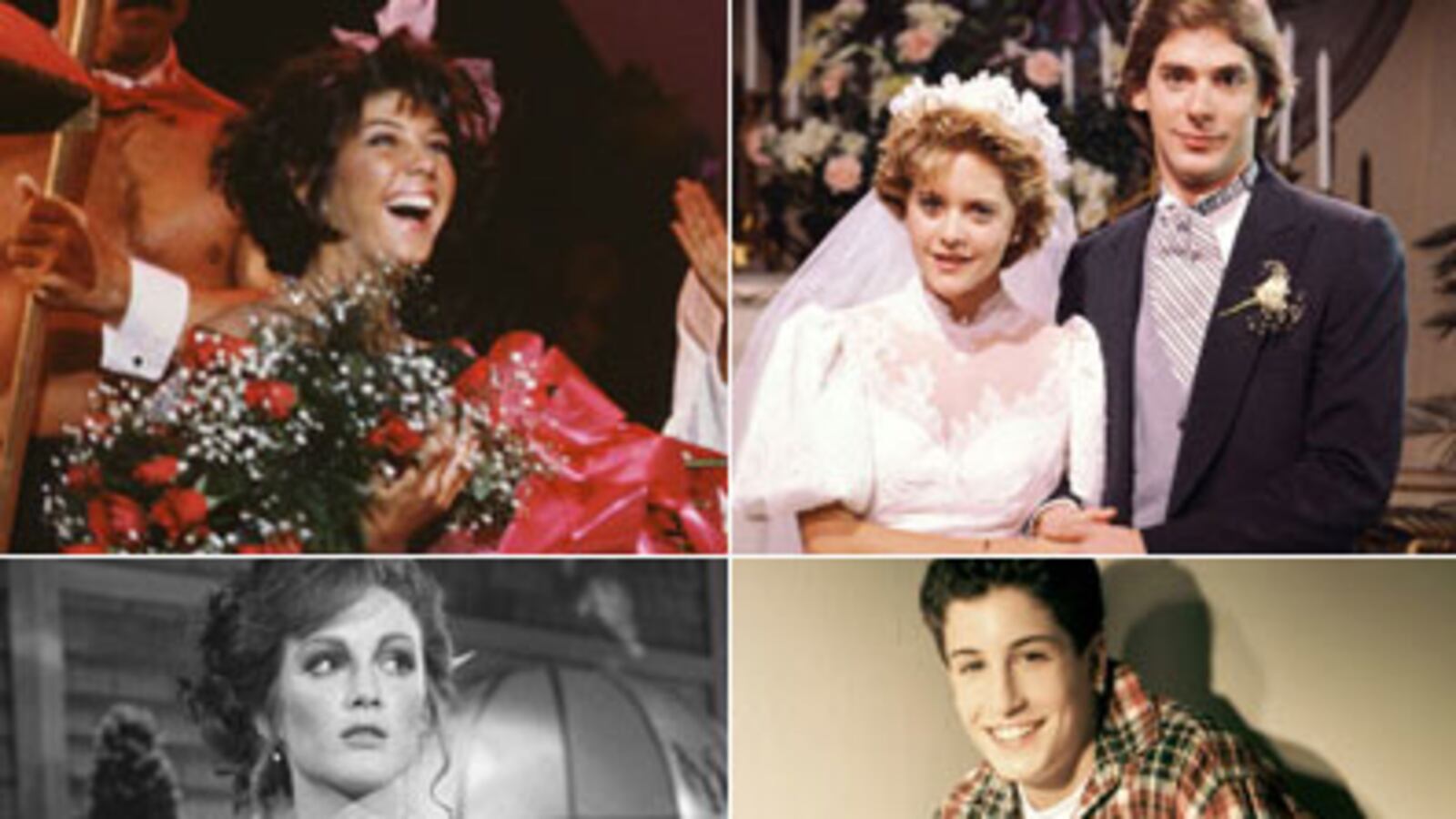Last week, after 54 years on the air, As the World Turns was canceled. This blow comes a few months after Guiding Light also came to an end. The daytime drama universe is down to six, almost half of what it was when I left it 10 years ago.
Back then—10 years ago, that is—I was working at a small soap-opera magazine based in New Jersey. The shows I was responsible for covering were As the World Turns and Another World (this as a result of an editor who didn’t like me much, for these were the days without DVRs, and both shows aired simultaneously). I had just finished a degree in screenwriting and soon realized that there were no screenwriting jobs available in the pages of The New York Times’ Help Wanted section. This job, however, was: A news editor for soap operas—news! I’d had a campy lifelong relationship with soap operas: A bout with chicken pox in 7th grade that fell right in line with a really romantic storyline about Julia and Mason and Mason’s cowboy split-personality, Sonny Sprocket, on Santa Barbara; a college roommate who lured me into the daily drama of Marlena’s possession and Kristin’s pretend pregnancy on Days of Our Lives. This job would be a hoot. We could sit around poking fun at soaps all day, and then write about it. Hilarious!
What I found, instead, was a culture of workers who took daytime very seriously. They were lifelong soap aficionados, with encyclopedic knowledge of just about every plotline, recast, return-from-the-dead, and switched-at-birth story there was. They wrote with heart; they cared what happened to these characters, to the actors who played them. They remembered epic weddings, tragic funerals, joyous reunions. They lived by these characters’ joy, celebrated with them; they mourned the characters’ tragedies.
Later, when I was poached by larger soap-opera magazine (and I do mean larger: It measured 11.5 x 13 inches, whereas the first one was digest-size, maybe 6 x 8 inches), this one in Manhattan, I hoped that I might find the people more relatable. Instead, what I found was people who were just more ambitious; they had gone to journalism school—journalism school!—to cover soaps. On desks were pictures they had taken with soap stars when they, the journalists, were tweens and the soap stars made local mall appearances. One showed me a picture of a wedding party she threw when she was in 6th grade and Jack and Jennifer finally married on Days of Our Lives.
Click the Image to View Our Gallery of Before They Were Stars: As the World Turns

We had TVs on our desks that were always on. Each Friday, we paused from our combination of watching and writing and gathered for the week-ending dramatic cliffhangers. I began to love my job—the camaraderie with which we watched TV all day, the lack of irony with which we called publicist-generated items “news.” Eventually, I think because I was from New York City and had the sense to avoid pleats, I was named co-Style editor. I started to relax and enjoy it.
As part of the job, I would go to the Daytime Emmys, which are at night (everyone asks that). As a member of the press corps, I got to walk the red carpet, much to my self-esteem’s detriment. “Who’s that,” asked the fans lining the velvet rope. “That’s nobody,” they’d answer themselves. I’d watch the show, cheering on the actors I’d come to call friends as they won their categories, or sigh at their losses. When Susan Lucci earned her first Emmy after 18 unrealized nominations, I stood and cheered. There wasn’t a dry eye at Madison Square Garden that night.
Click the Image to View Our Gallery of Guiding Light

Throughout this time, I got to know the curious beast known as the soap-opera actor, one whose most utilized methods are the long pause after questions and the searching look into his companion’s eyes that precedes a commercial break. I had to turn in a feature on a different one of them every few weeks, as well as submit lively quotes and style hints for readers at home. I got to know the actors, visited their homes. I took them to long lunches at fancy restaurants, and they would confide in me—tell me too much, too quickly. They weren’t sought enough to learn to put up defenses. In fact, they weren’t sought at all. They seemed grateful that I was willing to listen.
They never had to worry about getting burned by me. The work I did was a function of fan-generated desire. Fans didn’t want to hear the ugly truth about the actors they loved. They didn’t want to know about infidelity, bisexuality, or depression. They wanted the actors to mirror their characters: Noble, sexy, energetic. Everything the people in their lives weren’t. Even the villains on these shows are not so villainous; the baddies are easily redeemed through the love of their children, secret charity, or the love of a good woman or man.
Many of them had their own fan clubs, and they took the clubs’ members and activities seriously. They were always gracious to their fans and to us, the reporters. They loved the fame that came with being a soap star, and they never tired of it because, well, it was so limited.
At Manhattan’s nicest restaurants, we’d wait for our tables. It didn’t matter that the guy I was sitting with had accrued more screentime than Jerry Seinfeld or any of the Friends. If the hosts didn’t recognize the actor I was with (and they rarely did), we would find ourselves waiting despite our reservations. I will never forget the look on an actress’ face, the sadness in her eyes, when a former child star—I think it was Wil Wheaton—was seated ahead of us. I’ll also never forget the time that a waitress saw the tape recorder on our table and assumed that the actor was the reporter and that I was Monica Lewinsky.
The soap-opera actor is a divided creature. So grateful for something that seemed so unlikely—stable acting work—he is also ambivalent about this. Though he is afforded a very good salary and the ability to get home in time for dinner, he is also stuck playing the same not-too-dimensional character for years on end. Those who gravitate toward acting yearn for an outlet of many characters, as opposed to just one who has one agenda, one love, one desire, which is what you get when you play a soap character. By all accounts, playing wholesome gets boring pretty quickly.
Stability is a cozy blanket. Though you are still the person who wanted to play Hamlet in Central Park or star opposite Julia Roberts, your daily work and steady paycheck do much to quell, if not obliterate, the lust that compelled you to an acting career. And though you were going to pen great and important movies, your lust for writing is soothed by your daily reporting of things that aren’t news.
Click the Image to View Our Gallery of Celebrities on Soaps

We were the same, the actors and me. We both got comfortable too soon in our careers. We didn’t reach adequately, didn’t risk enough. We found comfort through activities and titles that would allow us to call ourselves by the desired outcomes of our dreams without working hard to actually fulfill them.
In the pursuit of my writing career, I often remember my actor friends. They weren’t really actors, except that they acted every day. I wasn’t really a journalist, though I disseminated information from morning till night. Rather, we both became very comfortable at our way-stations. When finally my layoff came (I was told that though this wasn’t a firing, it certainly seemed that my commitment to daytime drama was lacking), it shook me awake and forced me to attempt those things that mattered to me.
It would be about eight years until I finally wrote for real again, but I am at the beginning of being there. I struggle each day with pitches and writing, ever hoping that it will get easier, or at least more rewarding. I hope that laid-off soap-opera actors have it easier. They are certainly better-trained at their craft than I ever was at mine. For them, I hope they can reacquaint themselves with their natural talent, the spark they had before they embodied the same character for years. I hope they find what they started out looking for. And, finally, I hope we’re both brave enough for the attempt. Creative businesses of the heart are tricky; rejection hurts more the more we mean it. But a life without meaning? It might not be worth the steady paycheck.
Taffy Brodesser-Akner has written for the Los Angeles Times, Salon, and Babble, among other publications. She lives with her husband, Claude, and her son, Ezra, in Los Angeles, where she is waited on in restaurants by out-of-work soap opera actors who recognize her not at all.





